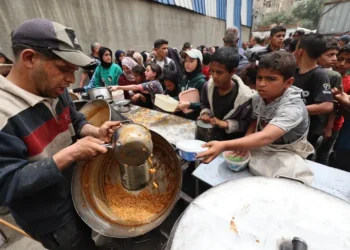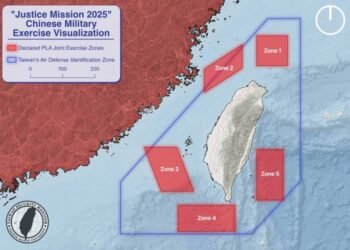As the holy month of Ramadan dawns upon the world, it is a time for reflection.
However, for the people of Gaza, this sacred month unfolds against the backdrop of the ongoing Israel-Hamas war.
The sacred journey of fasting, prayer, and reflection has been muted by the harsh realities of conflict.
Basic necessities such as food and water have become even scarcer, exacerbating the already dire humanitarian situation in the region.
Gaza, a land which is no stranger to adversity, now teeters on the cliff of desolation as hunger, coupled with Israel’s war, has overshadowed the solemn month.
The sound of bombs and the fear of airstrikes disrupt the tranquility that this month traditionally brings.
Instead of focusing on spiritual growth and self-reflection, Gazans are forced to confront the harsh reality of living under constant threat, where the simple act of breaking fast becomes a solemn reminder of the fragility of life.
Scarce resources, a result of the blockade and the destruction of essential infrastructure, mean that even securing a meal for iftar is a daily challenge.
The symbolic breaking of bread takes on a whole new meaning when there is uncertainty about where the next meal will come from.
Half of the enclave’s 2.3 million people are squeezed into the southern city of Rafah, with many living in plastic tents and facing severe shortages of food.
Despite the hardship, Palestinians in Gaza made preparations to observe the Muslim holy month of Ramadan under the shadow of an Israeli siege that has severely restricted food to millions in the besieged enclave.
Some tried to find cheer by decorating their tents with lights and lanterns.
Children in Gaza still celebrated the start of the Muslim holy month of Ramadan on Sunday evening.

In light of the destruction of all aspects of life in the besieged enclave, including dozens of mosques, the Palestinian Ministry of Foreign Affairs stated that Ramadan in Gaza this year will be “unlike the holy month in previous years or anywhere else in the world.”
The people in the north are suffering the most as they have been cut off from humanitarian assistance for months now.
Officials claim that an immediate ceasefire is needed there to avoid famine. Already 25 people have died of dehydration and malnutrition there.
Hamas’s political Chief, Ismail Haniyeh blamed Israel for the failure to reach a truce agreement before Ramadan and said Palestinians want a lasting ceasefire.
Interestingly, Israel continued its bombardment of Gaza on the first day of Ramadan, killing at least 10 people in an attack on Gaza City and three others in an air raid on southern Rafah.
In Ramadan Message, Biden Pledges To Push For A Ceasefire
US President Joe Biden said that the suffering of the Palestinian people is at the front of his mind.
He said that the US will continue efforts to get more humanitarian aid into Gaza and will work “non-stop to establish an immediate and sustained ceasefire for at least six weeks” as part of a deal that also releases captives held by Hamas.
According to news reports, Israeli forces prevented hundreds of Muslim worshippers from entering Al-Aqsa Mosque in occupied East Jerusalem for prayers to mark the start of Ramadan on Sunday evening.
Israeli forces barred men and young women from entering the mosque, only allowing women over the age of 40 to pray, it said.
Israeli forces have restricted entry to Al-Aqsa Mosque, Islam’s third-holiest site, for several months.
READ ALSO: Biden Delivers State Of The Union Address






















